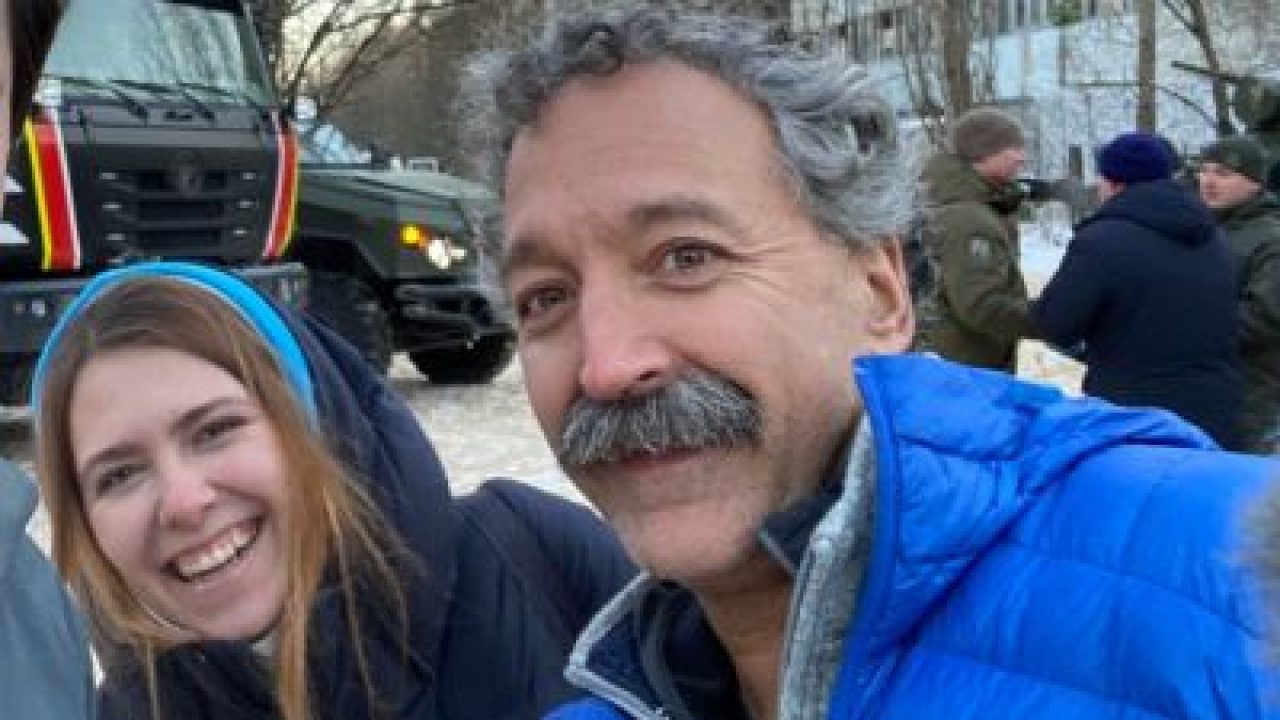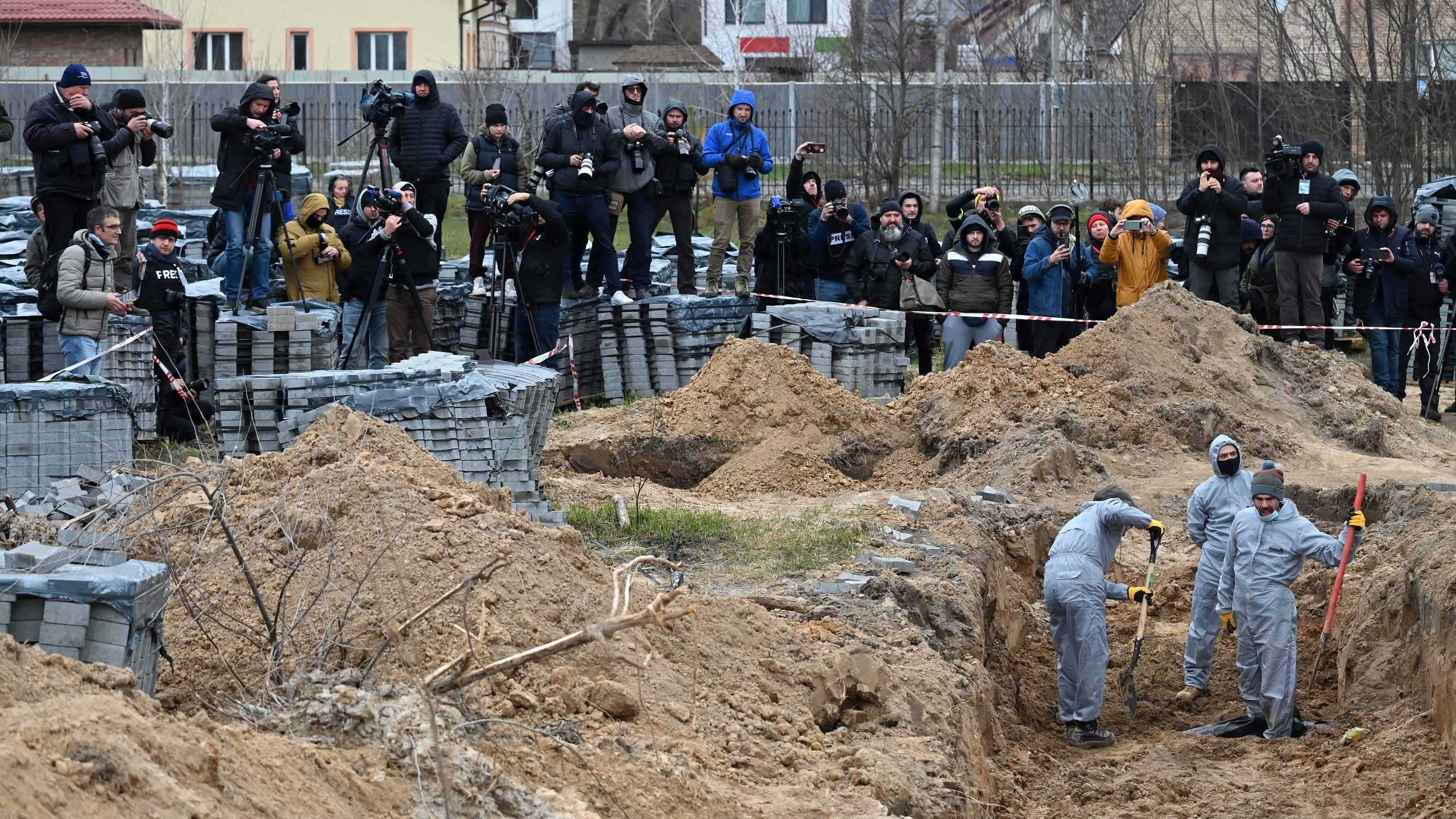Reporters Covering the Carnage in Ukraine Grapple with the Realities of War
Local, international journalists risk all to create the first draft of history
[Kyiv] For war correspondents, covering conflict is part of the job, but many say what they’ve witnessed in Ukraine is unlike anything they’ve seen before.
“I think in this one obviously the enemy is quite strong, Russia is very strong, so there’s a lot of apprehension in terms of the fighting force,” says British freelance journalist Owen Holdaway, who has extensively covered the wars in Iraq and Syria and has been on the ground in Ukraine from the start.
“In terms of the Iraq conflict, that conflict was more asymmetrical, so you weren’t really sure if you see a terrorist organization. Particularly in Mosul it was a lot more urbanized, a lot more intense in terms of that,” Holdaway told The Media Line.
He says what most concerns him on the front lines in Ukraine is the shelling and the risk of stepping on a mine.
In the early days of the Russian war on Ukraine, several journalists were killed, among them Fox News French-Irish cameraman Pierre Zakrzewski and producer Oleksandra Kuvshynova, who died when their vehicle was attacked in Horenka, outside Kyiv. British journalist Benjamin Hall was wounded in the same incident.

Producer Oleksandra Kuvshynova (L) and cameraman Pierre Zakrzewski (R) were killed died when their vehicle was attacked in Horenka, outside Kyiv, Ukraine. (Screenshot: Twitter)
US documentary maker Brent Renaud died in Irpin and Ukrainian journalist Yevhenii Sakun died in a Russian strike on the Kyiv television tower, and Viktor Dudar was killed in the southern port city of Mykolaiv.
“Journalists under international humanitarian law are civilians and attacks on civilians are never acceptable,” Scott Griffen, deputy director at the Vienna-based International Press Institute, said in an interview. He added that “targeted attacks on journalists in a conflict zone amount to a war crime.”
At least seven journalists covering the war in Ukraine have been killed, according to the New York-based Committee to Protect Journalists (CPJ).
CPJ has called for the protection of Ukrainian journalists along with the international reporters and media workers who are covering the conflict.
Many journalists and their media outlets were caught off guard when Russian forces crossed into Ukraine on February 24, despite having been preparing for a possible invasion.
Hundreds of journalists from all over the world are reporting on this war, spending long hours each day gathering news for their reports. But coverage of this crisis wouldn’t be possible without Ukrainian journalists, torn between doing their jobs and worrying about their country and their loved ones.
Ukrainian journalist Tatiana Papora told The Media Line that when her TV channel sent her from Kyiv to Lviv, she was hesitant, but her editor convinced her it was best to continue reporting. But then she decided to return to the capital to report on the war firsthand.
“Our main office stayed. Some people left for western Ukraine because in the beginning, it was very dangerous [in Kyiv] and we didn’t understand what was going on, we wanted to do our work and not to stop. … I was also sent there [to Liviv] for the first four weeks. But [I] did daily online streams for [our] TV channel. Then when it became less dangerous, I returned and now I’m visiting Irpin and Chernihiv and such places.”
The veteran reporter says being away from the front lines deprived her of the ability to report on events. Having spent a month in Lviv, Papora felt compelled to return to the capital.
“It’s very interesting because a lot of journalists right now are in western Ukraine. They are wearing helmets and vests like it’s very dangerous there but in reality, it’s not so dangerous like here or on the front line. I think they should move to Kyiv and Kharkiv, to Mykolaiv, to Odesa, and report what’s going on around all Ukraine and how people who were under Russian occupation fared and what Russians did there.”
Papora says that before the invasion, she had no plans to become a war correspondent, but she couldn’t stand by and do nothing. It is difficult for many Ukrainian journalists to see the level of destruction taking place in their nation, but they have to go out and report.
“Of course, it’s tough because you still have a feeling it’s your city, your infrastructure which was destroyed, but at the same time I think there is no more interesting place on earth now than Ukraine.”
Many local journalists had to work from metro stations to stay safe, or else simply ignore the shelling and go on with their coverage.
Cameraman and studio engineer Michael Noga moved from eastern Ukraine’s Donetsk region to assist in the coverage of war for his Kyiv-based TV channel.
“You hear loud sounds from outside the studio and we continue working, we continue transmitting our TV shows about the situation, about this war and invasion. You know it’s kind of scary when you hear the bomb explode near you, but you understand that you are where you belong, that nobody else can do this. We stay, we show it and we hope for better,” he says.
Kristina Atovska is the correspondent for North Macedonia’s Free Press − Morning Briefing. She works solo and does everything for herself.
“For me, it’s a little bit hard because I’m alone. They didn’t send my cameraman with me, so maybe that is the hardest part of [covering] the war because I have to film, photograph, do reports and write everything by myself. But here I must say that I had a lot of training for war. I think I know what I’m doing,” she says.
Being a woman reporter in a war zone comes with some difficulties, she adds.
“I take every measure of precaution. Because I’m a woman I have to watch out more for myself, I can’t be that free like you,” she told The Media Line. “I can’t go in a car with someone I don’t know, I can’t stay with someone I don’t know. That’s the scariest part I think.”
Atovska says Ukrainians are not accustomed to war, and the conflict has made them suspicious of outsiders.
“The locals aren’t used to it; some journalists published photos or videos and apparently, they were not supposed to. Since that moment all the journalists here feel threatened because the locals are not so pleased that we are filming.”
This is mostly the case outside the capital region, she notes.
“Here in Kyiv, they are more aware of our mission here. They accept us more. Also, I can say the army, they are very much more understanding of our mission.”
Holdaway says that as in any conflict, journalists must be hypervigilant when going to dangerous areas. But despite the risk to his life, he is determined to continue his reporting, adding that it’s a humbling experience and a privilege to do what he is doing.
“Honestly, it’s a somewhat selfish thing as well, I think journalism at its best it’s the first draft of history. And if you are there and seeing the first draft of history it’s beautiful,” he says.
Still, he adds, “I know there are a lot of problems with covering conflict, and to be honest there’s not the same money there was pre-social media.”

